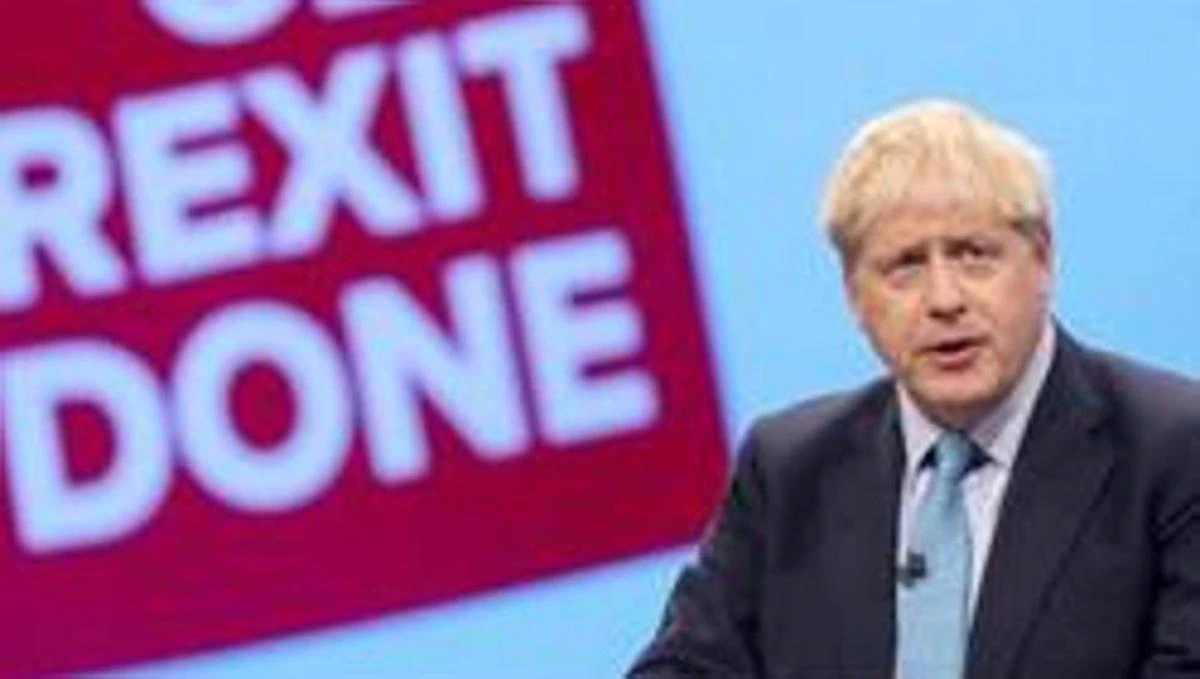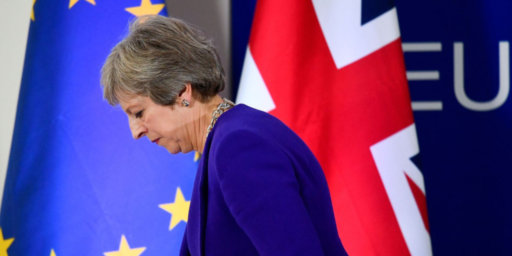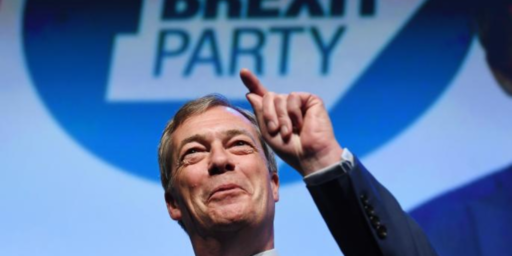U.K. And E.U. Reach New Brexit Deal, But Will It Pass Parliament.
The United Kingdom and European Union have apparently reached a new Brexit deal, but it's unclear if Boris Johnson can get it through Parliament.

British Prime Minister Boris Johnson and European Commission President Jean-Claude Juncker announced that the United Kingdom and European Union had reached a new deal on Brexit that would avert a hard, no-deal, Brexit, but it is entirely unclear if the measure can pass the British Parliament:
BRUSSELS — European and British negotiators struck a deal Thursday to split Britain from the European Union, raising the prospect that the country could be out of the bloc by the end of October.
Negotiators working through the night in Brussels agreed on a draft Thursday morning after Prime Minister Boris Johnson signed on despite lingering questions about the feuding factions in London. The agreement still needs approval by European leaders and the British Parliament.
“This deal represents a very good deal both for the E.U. and the U.K.,” Johnson said in Brussels ahead of the meeting. “Now is the moment for us to get Brexit done and then together to work on building our future partnership.”
British lawmakers passed a law requiring Johnson to ask to delay Brexit past the Oct. 31 deadline if a deal to ease the exit is not in place by Saturday.
“Where there is a will, there is a #deal – we have one! It’s a fair and balanced agreement for the EU and the UK and it is testament to our commitment to find solutions,” European Commission President Jean-Claude Juncker wrote on Twitter.
But even as European leaders appeared to embrace the hard-fought agreement, serious doubts remained about whether Johnson could rally Parliament behind him. Already, some hardcore Brexiteers are saying they will hold out against him, the Labour Party is opposed, and Northern Ireland’s Democratic Unionist Party is in rebellion.
The 10 members of that party have held outsize power over Brexit in Parliament. The Northern Ireland unionists, who are committed to serving their Protestant, pro-British, antiabortion and conservative base, were brought in to prop up the government of Johnson’s predecessor, Theresa May, after she lost her majority in the Parliament in 2017 elections. To support May’s government, they extracted a promise that the government spend 1 billion pounds (about $1.3 billion) in Northern Ireland.
If there is a vote on the deal in Parliament on Saturday, Johnson will face a huge showdown. Since he became prime minister, Johnson’s working majority has vanished. From one seat up, he is now 43 seats down, meaning he will need the support of other parties to get the deal approved.
“It is our view that these arrangements would not be in Northern Ireland’s long-term interests,” the Democratic Unionist Party said in a statement. “Saturday’s vote in Parliament on the proposals will only be the start of a long process to get any withdrawal agreement bill through the House of Commons.”
Nor did other parties appear eager to lend Johnson a hand. Jeremy Corbyn, leader of the opposition Labour Party, said that from what was known, the agreement reached on Thursday was an “even worse deal” than May’s. He said that the “best way to get Brexit sorted is to give the people the final say in a public vote.”
Under the deal — which focuses mostly on the split from the European Union, not on how the two sides will work together in the future — Britain would leave the European Union but would continue to apply E.U. rules until the end of 2020 in a transition period that would soften the split. E.U. and British negotiators would try to hammer out a trade deal and other elements of their future relationship in the meantime. The transition period could be extended up to two years if both sides agree.
The split would be a harder break than ever envisaged by May, Johnson’s predecessor as prime minister, with Britain potentially taking a sharply different line on trade, taxes and regulations. May’s plans would have left Britain tightly integrated.
But Northern Ireland would remain largely aligned with the bloc, at least for now, even though it is leaving the E.U. along with the rest of the United Kingdom.
Elements of the new deal crossed red lines that previous British leaders ruled out. British authorities will have to conduct customs checks in the Irish Sea for goods moving inside their own country, as Northern Ireland would remain locked into most E.U. regulations and trade rules.
But the E.U. also made significant concessions that it had previously said were impossible. After four years, Northern Ireland lawmakers would have a vote on whether they wanted to stay so closely aligned with the European Union.
The next step will be for Juncker to gain the support of the rest of the E.U. leadership, which seems likely to take place as early as today. After that, the deal will have to be approved by the European Union Parliament and by the British Parliament. Approval in the first body seems likely as long as the leadership is united in approving the deal, but things are far less certain when it comes to the British Parliament.
As we’ve already seen, getting a Brexit deal through the House of Commons is much easier said than done. It was the at the start of this year, for example, that the Commons rejected former Prime Minister Theresa May’s Brexit deal in a rebuke that was so overwhelming that Parliamentary historians said that no previous Prime Minister had suffered such a defeat in time since Parliament, rather than the Monarch, became the primary policy-making power in the United Kingdom. Several attempts on her part to renegotiate a deal that would be accepted by Parliament. While E.U. negotiators did agree to changes to the original deal, those changes were insufficient to craft a deal that could garner majority support in Parliament. This ultimately led May to step aside, which led to Boris Johnson’s ascent as leader of the Conservative Party and his ascension to Prime Minister.
Soon after becoming Prime Minister, though, Johnson ran into political trouble of his own as Parliament, including many members of his own party, made moves to block a hard no-deal Brexit at the current October 31st deadline. In response, Johnson sought and obtained Queen Elizabeth’s assent to an extended suspension of Parliament. This move was soon declared to have been illegal, though, and Parliament returned with a headful of steam that led to the passage of several laws over Johnson’s objection that effectively seeks to block a hard Brexit, thus forcing Johnson into these negotiations.
As things stand, the numbers in Parliament don’t appear to be in Johnson’s favor. While he will likely be able to get most if not all of the Conservative Party MPs to support the deal, that won’t be sufficient to get the measure passed. As a result, Johnson is going to have to count on support from other parties or Members of Parliament to get a deal through. The prospect of that happening became significantly less likely just hours after the announcement of the deal when the Democratic Unionist Party, which has been supporting the Conservatives under an agreement that has been in place since the last General Election, has already said that it cannot support the deal due to deficiencies in how it handles the issues impacting Northern Ireland and the Irish Republic.
Without their support, Johnson will need to look elsewhere for the votes he needs to get a majority supporting the deal. The problem is that it’s unclear where that will come from. Labour appears unlikely to be willing as a party to help Johnson out, so the best he can hope for there is that some of the pro-Brexit members might vote for the deal. Other than that, the other parties in the Commons — the Liberal Democrats and the Scottish National Party — are both opposed to Brexit and thus unlikely sources of support. Whatever the fate of the deal, we should know as early as Saturday whether the deal will be approved. If the answer is no, then we’re either looking at a hard Brexit at the end of the month or an extension of the deadline, although Juncker apparently said today that there would be no extensions and that the Brits must accept this deal or no deal.
As they say, stay tuned because this story is moving rapidly.





No. It won’t pass Parliament.
The ability of U.K. political parties to act like a bunch of spoiled teen-agers….DUP having a hissy fit, Corbyn + Labour stuck in their own hamster wheels…..
I think if this gets voted down in Parliament and Boris gets pushing into asking for an extension, the EU should say: “You guys are never going to get your act together and we can’t afford to spend any more times dealing with your political soap opera. You want a no-deal Brexit/WTO? Fine. We will assume that you will leave the EU at the end of three months. During the next three months we will prepare and you will prepare, but with no more communication and no more negotiating.”
Isn’t this exactly May’s gambit that failed three times?
Looks like ERG are on the bus and DUP under it. Now depends on numbers in Commons.
Quick and dirty calculation is, if everyone votes as per 3rd vote on May Deal, but the 28 ERG then against now vote for, then Johnson needs 4 more votes from somewhere to get over the line.
That’s going to be difficult; the 3rd vote hit the limit on “easy” Labour defectors, and had most of the now expelled Conservative rebels too.
Latter may back on principle, but on other hand have good reason to bear a grudge against Johnson.
More Labour votes could be likely picked up in despite the Corbynites if Johnson offered a referendum (could LibDems switch for that? not likely IMHO).
But if he goes for a referendum the ERG will surely revolt again.
@de stijl: Yup. It’s hilarious reading the obsequious hair-splitting over at The Telegraph attempting to justify why May’s WR Was Really Bad but Boris’s WR Is All Right. Gotta support their local boy…..I note they’re rerunning Boris’s old columns by the dozens (who, us? No, we’re not trying to wave pompoms for Alexander de Pleffl Boris Johnson, we’re just republishing old stuff in the files…)
Well, his words included:
Seems to me like stating there is no need or desire for an extension; not that there cannot be one.
(Also, that Juncker is probably thoroughly fed up with Brexit.)
However, it’s not Juncker’s role to determine, it’s the Council that decides.
There the calculus remains: EU wants a deal over an extension, but extension over no deal, so long as Ireland (supported by Germany) is firm against no deal; but now a deal is on the table they will push back hard against talk of extension, but not rule it out.
Another thought occurs.
Text of Benn Act on condition for mandatory request for extension requires
Some legal commentary says “copy of the agreement” entails full legal text.
Other commentators disagree.
Surely the full text can’t be ready by Saturday, so presumably Commons will need to pass a resolution or amendment accepting whatever is presented.
If I’m right, this means it can’t be just a straight yes/no vote, must be amendable.
If amendable, room for all sorts of parliamentary manoeuvres, if the Speaker allows, which Bercow likely will. And enable Commons to require as much detail as currently available, not just an indicative formula.
And the more detail there is, especially if the DUP stay Nay, there more likelihood of some ERG-ists getting queasy.
Edge of the seat stuff and no mistake.
Britain,
Do not trust a purportedly “blond” man with a sub “Dumb and Dumber” haircut.
Trust me, it doesn’t work out well for you.
If Jim Carrey can sport that style with more panache than your political head of state, you’re in for really unpleasant roller-coaster ride you’ll regret.
@grumpy realist:
Shame they didn’t include his most famous unpublished column that of 19 February 2016 arguing against Brexit.
Johnson has contended it was just “setting down arguments on paper” before making a considered judgement.
Others (like me) are certain Johnson only favoured Brexit to ensure he was the activists favourite to succeed Cameron.
Tiny has been often pursued what were Obama’s policies under a different name, why can’t BJ rename Mrs May’s?
@de stijl:
Essentially it’s May’s deal, but with her proposals for Northern Ireland border issues solved at all-UK level, removed and replaced with the EU’s initial proposals from 2017 for an Northern Ireland-only backstop, albeit in cursory disguise.
Oh, my cup of irony overfloweth!
Nigel Farage has commented on Juncker being against an extension, disregarding the Benn Act, slighting Parliament, forcing a choice of this deal or no deal.
The extensions Farage has railed against, the Benn Act the Brexiteers call “the surrender act”, the No Deal he has called the best option, the Parliament he has branded an anti-democratic stronghold of Remainers.
My evens have gone looking for a can’t, and may not be back for some time.
The way things have been going, I expect that the only way they will pass a deal is if the deal is somehow going to make things worse than just crashing out.
“Article 4, paragraph 3 clearly states that if the British people are physically on fire, the EU will provide emergency kerosine, bypassing any export controls, on credit, and at usurious rates.”
I won’t hazard a guess on what the Commons might do. For one thing, I’m not familiar enough with British politics. For another, it may be more MPs will vote for what is essentially May’s deal now that Boris has mansplained it.
This throws the Irish Protestants under the bus. Realizing that the rest of Britain considers them just as discardable as their Catholic neighbors must create a mighty psychic shockwave.
@MarkedMan:
Please do not tell me someone would reignite The Troubles for political gain.
@de stijl: There’s a story about an American and an Englishman talking about civil rights in the US in the early 60s where the Englishman suggests that the civil rights issue is an example of Americans getting overwrought for nothing. When the American suggests that the UK has its own civil rights problem that is just as intense in Ireland, the Englishman says that the two can’t be compared because negroes are human beings.
Reignite The Troubles for political gain? Why not? It’s not like actual people will be hurt. (I really hope that I’m being hyperbolic.)
I suspect that the DUP are currently adapting the famous lines by the Ulster Unionist Edward Carson from 1921:
(delete Conservative Party; insert Boris Johnson)
@de stijl:
The Conservatives, and even the more extreme UKIP/BP, weren’t intending to restart the Troubles, but they were being culpably reckless with the conditions that allowed the Good Friday Agreement (i.e. the ameliorative effects of both the UK and the Republic of Ireland being in the EU) and the potential of a revived border in Ireland for causing inter-communal tension, plus the possible economic impact on Northern Ireland and the Republic.
Thankfully the EU insistence on a backstop that respects the interests of Ireland has avoided the worst of these risks. But unless carefully managed, radical “Loyalist” resentment might have dangerous consequences.
OTOH it might make the DUP more realistic about longer term intra-communal and all-Ireland cooperation.
Counting so far indicates a knife-edge vote where “NO” wins.
Which would mean back to the hamster wheel of the U.K. requesting an extension, getting an extension, and another six months of political infighting….
@MarkedMan:
Good analysis of the politcal psychology of the DUP by Fintan O’Toole in The Irish Times
More generally on the proposed deal and its consequences, Chris Grey blogpost.
Hope I’m not causing to much tedium with all this, but re. my earlier, looks like the motion was voted amendable late Thursday.
And the amendments are coming in, and this looks v. significant and clever by Oliver Letwin.
This would enable MPs to vote in principle for the Johnson’s deal, but to also trigger the Benn Act and require an extension by withholding formal approval until the full legal text is submitted, considered and voted through.
There’s a good chance of a majority for this IMHO.
Govt.would loathe being forced to ask for even a “technical” extension.
Might also give extra manoeuvre space for those wanting to attach a referendum requirement or similar.
So Saturday might not be the grand finale after all.
Plus: Foreign Secretary Raab once again opens mouth, inserts foot:
Labour MP replies:
SNP go ballistic in 3, 2, 1…